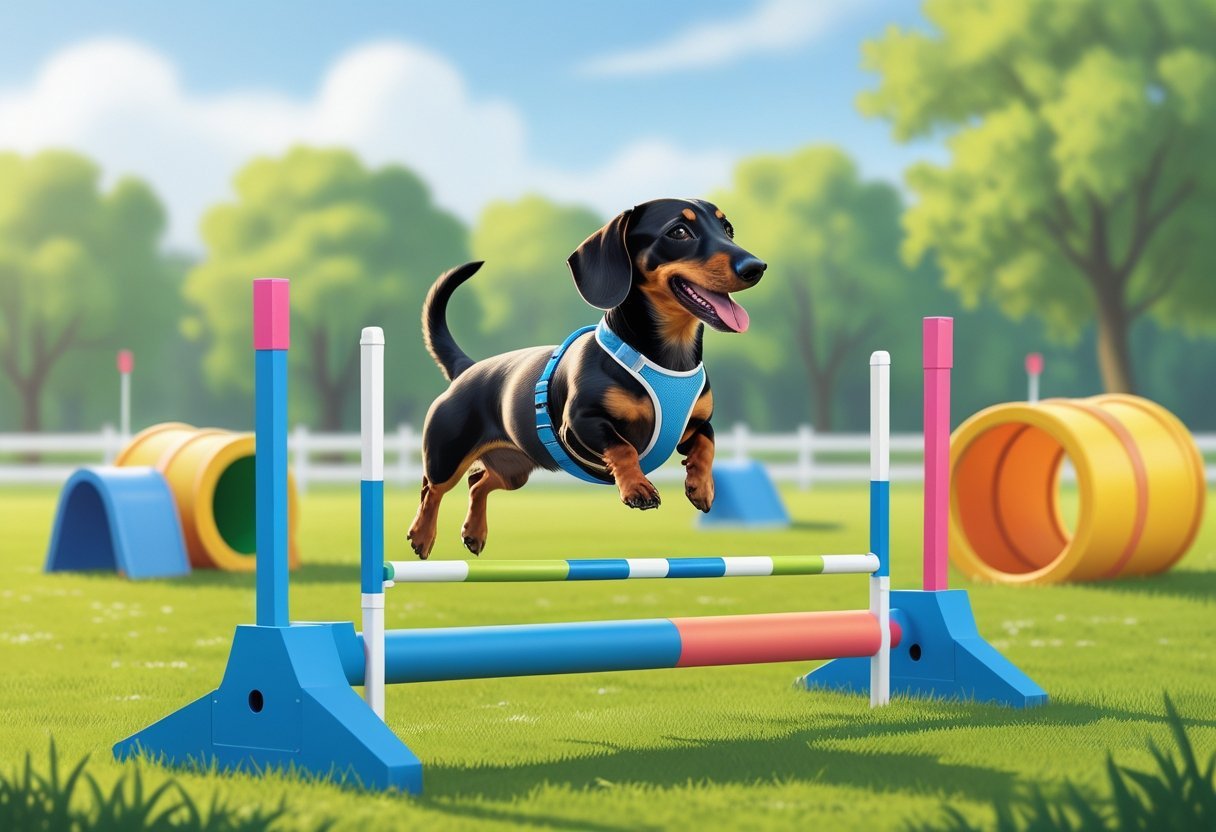Dachshunds might be short-legged 🐾, but wow, they’ve got a surprising amount of athletic spark 💨 just waiting to burst out. These energetic little dogs were bred to hunt 🎯, so they come with natural agility that you can really develop through proper training and fun activities 🎪.
With the right approach to agility training 🏃♂️, dachshunds can enjoy both physical and mental perks 🧠, all while keeping their unique backs safe from injury ❤️.
Plenty of dachshund owners worry about back problems when thinking about agility training ⚠️. That concern is totally valid, but honestly, it shouldn’t stop you from trying this rewarding activity with your wiener dog 🐕.
The trick is to tweak traditional agility exercises 🔄 so they fit your dog’s body type, and to build up strength slowly 💪.
Key Takeaways ✅
- Dachshunds can join in on agility—just stick with modified activities that protect their backs but keep them mentally and physically stimulated. 🐾
- Start with basic conditioning exercises to get your dachshund’s core muscles strong before adding agility equipment. 💪
- Keep training consistent and short, with proper warm-ups, so your pup develops skills while staying safe and having fun. 🎉
🐾 Free Dachshund Care Guide
Download our free checklist to ensure your Dachshund stays happy, healthy, and well-loved!
Get Your Free Guide 🐶Understanding Agility for Dachshunds
Dachshunds might not look like classic athletes 🐕, but they pack some remarkable abilities 💪 that make them surprisingly good at agility training. Their intelligence 🧠, stubborn determination, and hunting instincts 🎯 all work in their favor.
What Is Dog Agility? 🏆
Dog agility is a sport where handlers guide their dogs through obstacle courses against the clock ⏱️. The courses usually include:
- Jumps (lowered for little legs) 🐾
- Tunnels 🎪
- Weave poles 🔄
- A-frames 🛝
- Seesaws ⚖️
- Pause tables ⏸️
Dogs have to complete the obstacles in a set order without mistakes, or they get penalties 🚫. For dachshunds, the equipment gets a few tweaks so it suits their long bodies 🦴.
The sport popped up in the UK back in the 1970s 🇬🇧 and now it’s huge worldwide 🌍. It needs both physical fitness and mental focus from the dog, plus clear teamwork between you and your pup 🤝.
Each course changes up, so things stay interesting 🎯 for everyone. You’ll find events from tiny local gatherings to big national championships 🥇.

🥗 Wild Earth Complete Protein – Clean Energy for Agility Stars
Plant-based, vet-developed formula that fuels your Doxie’s agility sessions without upsetting their tummy — perfect for sustained, healthy energy.
- Supports lean muscle for safer jumping and weaving 💪
- Rich in omega fatty acids for joint and coat health ✨
- Easy to portion before each agility practice 🥄
Why Dachshunds Excel at Agility 🌟
Dachshunds were bred to chase badgers underground 🦡, which gave them some pretty unique traits. That stubborn tenacity and problem-solving ability? Perfect for agility ✅.
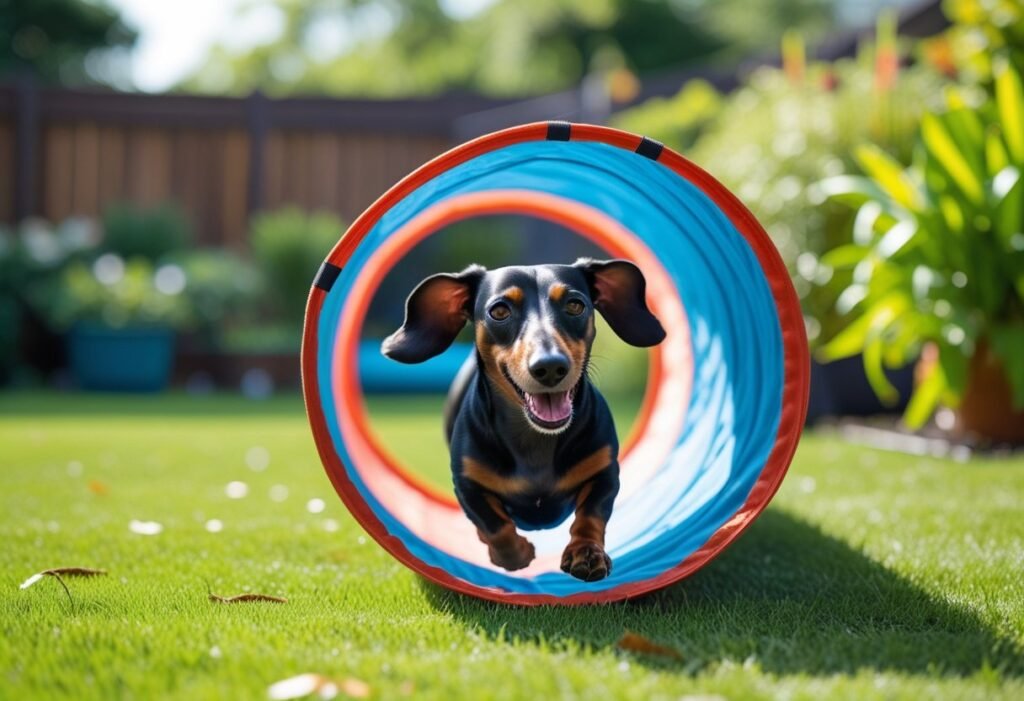
Their compact size lets them zip through tunnels with ease 🚀. Even with short legs, many dachshunds can turn on a dime and pick up speed pretty quickly 💨.
Natural Dachshund traits that help in agility:
- Strong prey drive 🎯
- Determination 💪
- Intelligence 🧠
- Desire to please ❤️
- Competitive spirit 🏅
Most dachshunds approach agility with a tail-wagging sort of joy 🐾. Their big personalities make them a hit with crowds at competitions 🎉.
Jumping can be a challenge because of their shape, but their athleticism shines in other ways ✨.
Benefits of Agility for Doxies 🐾
Agility training brings a ton of physical and mental benefits for your dachshund 🐕. Regular activity helps keep their weight and muscle tone in check, which is crucial for avoiding back issues 🦴.
The mental challenge keeps boredom at bay and cuts down on destructive habits 🛑. Lots of owners notice shy dogs getting braver after starting agility 🌟.
Key benefits:
- Strengthens core muscles to support the spine 💪
- Boosts coordination and balance ⚖️
- Gives controlled exercise 🏃♂️
- Deepens the bond between you and your pup 🤝
- Offers social time with other dogs and people 🐶
- Burns off extra energy in a good way 🔥
Agility also channels your dachshund’s hunting instincts into something positive ✅. It scratches their itch for both brain games 🧩 and physical activity 🏃♂️.
Most training sessions last about 15-30 minutes ⏳, which is pretty doable even if you’re busy. The skills you teach often help with behavior at home, too 🏡.
Safety First: Preparing Your Dachshund for Agility
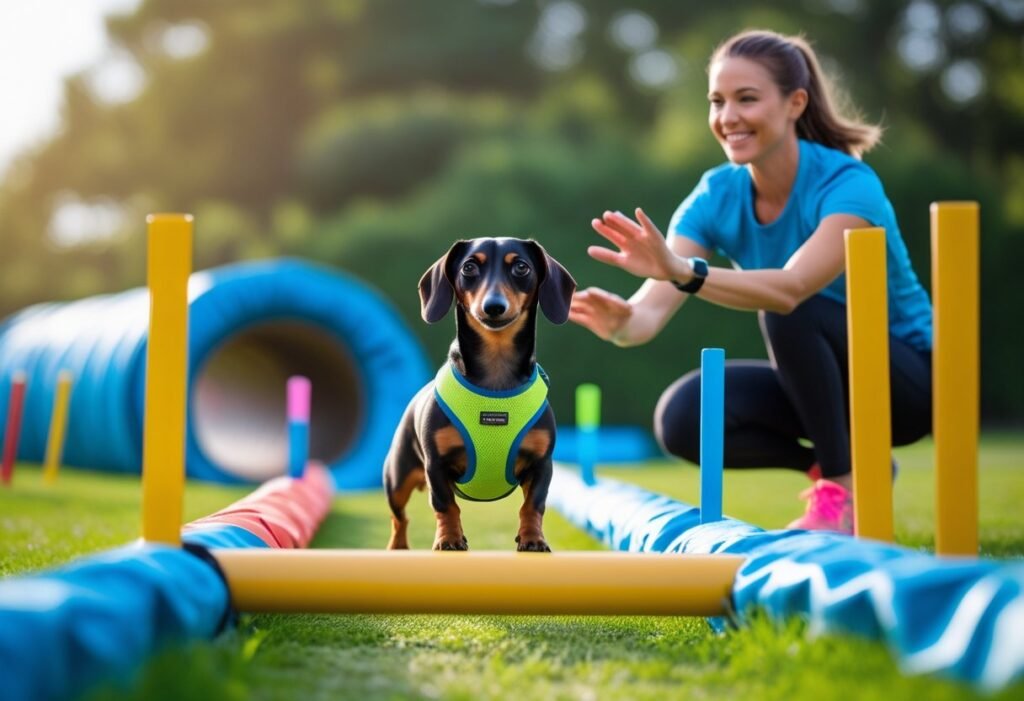
Before you jump into agility with your dachshund 🐾, it’s crucial to prep them properly. These dogs have a unique build 🦴, so a few safety steps will help them enjoy the sport for years without injuries ❤️.
Health Checks and Vet Approval 🩺
Check in with your vet before starting agility 🏃♂️. They can tell you if your dachshund’s spine, joints, and overall health are up for the challenge ✅.
Ask about your dog’s back health 🦴, since their long spine makes them prone to intervertebral disc disease (IVDD) ⚠️. Sometimes, a vet will suggest x-rays to check things out before you get started 📸.
Your dachshund should be at a healthy weight before training ⚖️. Extra pounds put a lot of pressure on their back and joints, so follow your vet’s advice for diet and exercise 🥗.
Make sure all vaccinations are up to date 💉. If your dog has any age-related or health quirks, talk them over with your vet so you know what to watch for 👀.
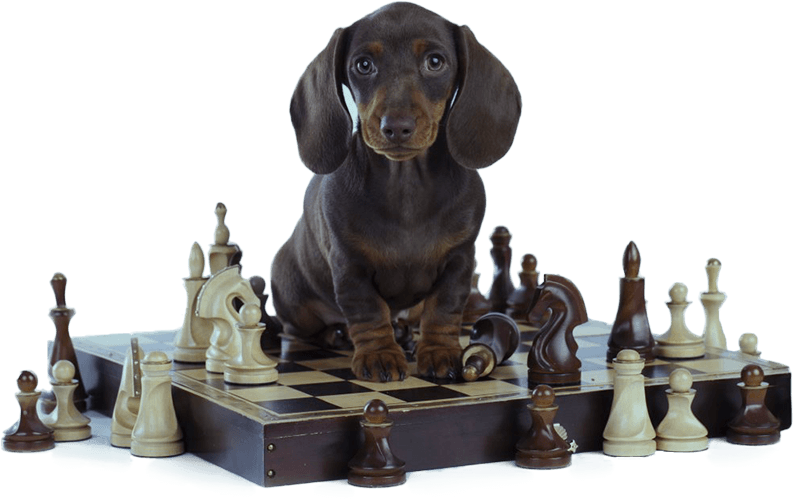
🧠 Brain Training for Dogs – Sharpen Your Doxie’s Agility Skills
Fun, proven mental games that boost focus, problem-solving, and responsiveness — essential for confident, smooth agility runs.
- Improves focus for faster obstacle completion ⏱️
- Builds confidence to tackle new challenges with ease 🐾
- Great indoor training option for rainy days 🌧️
Age-Appropriate Training 📅
Wait until your dachshund is done growing—usually around 12-18 months—before starting real agility ⏳. Hard jumps or tricky obstacles too early can mess up developing joints and bones 🦵.
If your pup is under a year, stick to basic obedience, socializing, and easy foundation skills like targeting or crawling through a tunnel 🎯. Keep it low-impact and short ⏱️.
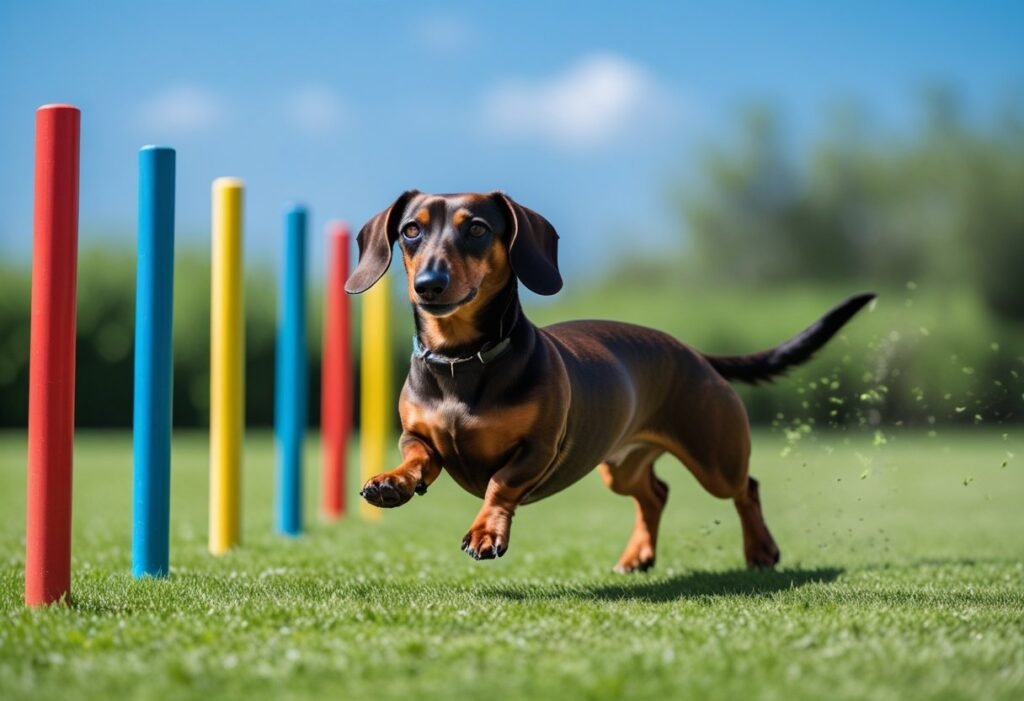
Older dachshunds (7+ years) can still do agility, but with lower jumps, slower turns, and shorter sessions 🐕. Adjust things as their bodies change 🔄.
Watch for signs of tiredness or discomfort 😴. Dachshunds sometimes hide pain, so look for changes in how they move or act 👀.
Warm-Up and Cool-Down Practices 🔄
Always warm up your dachshund before agility 🐾. Try a 5-10 minute walk 🚶♂️ and some gentle stretching to get their muscles ready 💪.
Good warm-up ideas:
- Walking at different speeds 🚶♀️
- Doing figure-eights around cones 🔄
- Light play with toys 🎾
- Target touches 🎯
After training, cool down with a slow 5-minute walk 🚶♂️. This helps their heart rate drop ❤️ and keeps muscles from getting stiff 🦵.
Massage can really help, too 💆♂️. Use gentle strokes along the back muscles (but don’t press right on the spine) to ease any tension after exercise 🌿.
Keep an eye out for heavy panting 😮💨 or if your dog seems reluctant to keep going 🚫. Rest days between sessions are important for recovery 💤 and to avoid chronic strain.
Choosing the Right Equipment
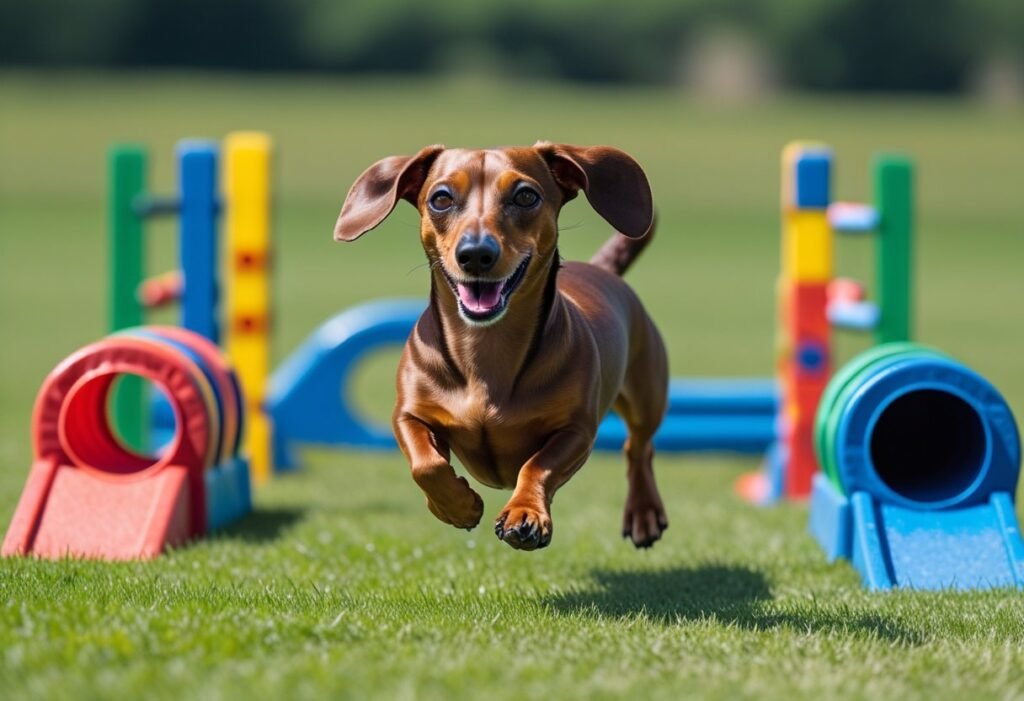
Picking the right agility gear for your dachshund 🐾 takes a bit of thought. Their long backs and short legs mean you need to choose obstacles that let them have fun 🎯 but stay safe ❤️.
Dachshund-Friendly Obstacles 🏆
Start with jumps no higher than your dachshund’s elbow 📏. That way, their back doesn’t take a beating 🦴. Tunnels should be roomy—at least 24 inches wide—so they can scoot through comfortably 🐕.
Weave poles are great, but space them a bit wider than usual—try 24 inches apart instead of 20 🔄. This gives your dog room to twist without straining their spine 💪.
Hold off on A-frames and dog walks until your dachshund has built up some serious core strength 🏋️♂️. When you do try them, keep the heights low and the inclines gentle 🌿.
Tire jumps can work if you keep them low and use breakaway designs that fall apart if your dog misjudges the jump 🛞.
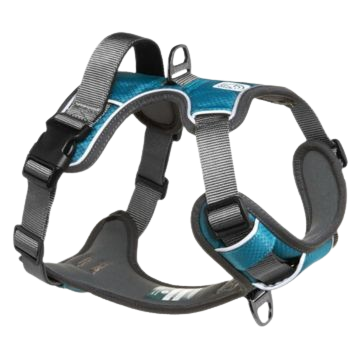
🎽 Embark Pet Adventure Harness
- 🐕 Perfect for agility training and obstacle navigation
- Distributes pressure safely to protect your Doxie’s back
- 💪 Lightweight, durable, and designed for confident movement

🌿 Zumalka Calmpet Anxiety Relief Drops
- 🌸 Helps calm your Doxie before agility training sessions
- Natural formula supports focus and reduces tension
- 🧘 Great for easing competition or travel stress
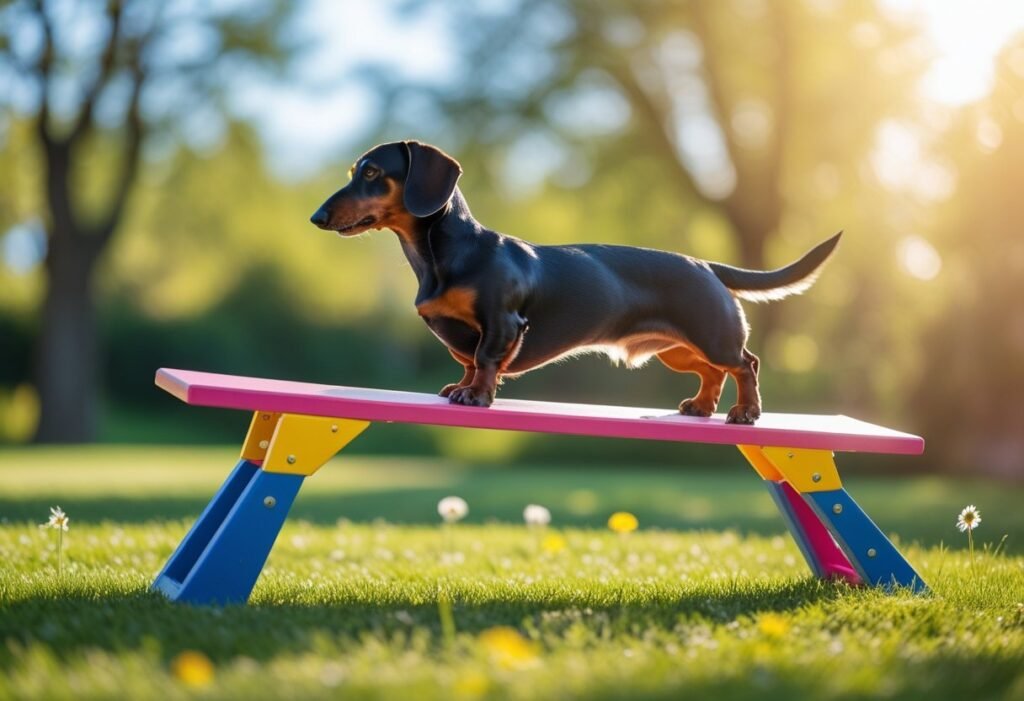
Adapting Equipment for Long Backs 🛠️
Use ramps instead of stairs whenever you can 🛤️. Ramps let your dachshund move up and down without risky jumps, which helps protect their back 🦴.
Look for mini versions of standard equipment 🐾. More companies now make “small dog” gear that’s just right for dachshunds and similar breeds 🐶.
Soft surfaces matter a lot 🌱. Train on rubber mats, artificial turf, or soft grass—not hard concrete or packed dirt 🚫. This cushions their landings, even on tiny jumps 🏃♂️.
Add foam padding around any spots where a fall might happen 🛡️. Extra cushioning at the base of obstacles gives added protection if your dog slips 🐕.
Raise the height and difficulty of obstacles slowly as your dachshund gets stronger 📈. Never rush; your dog’s spine always comes first ❤️.
Training Tips: Teaching Agility Skills
Training a dachshund for agility 🐾 takes patience, a bit of creativity 🎨, and a real understanding of their unique build 🦴. The right approach keeps your dog safe ❤️ and helps them shine as little athletes 🌟.
Essential Commands for Agility 🎯
Start with basic commands like “sit,” “stay,” and “come” 🐕. These basics set the stage for everything else and keep training sessions safe ✅.
Add in directional cues—”left,” “right,” and “forward” ↔️—to guide your dog through obstacles. Pair hand signals ✋ with your words for extra clarity.
Teach “wait” and “release” for starting obstacles ⏳. Your dachshund should hold still until you give the go-ahead, which keeps things calm and lowers the risk of injury ⚠️.
Practice “target” training so your dog learns to touch a specific spot with their nose or paw 🐾. This comes in handy for hitting contact points on equipment 🛝.
📍 Tractive GPS Tracker
- Real-time tracking during outdoor training
- Set safe zones with instant alerts
- Waterproof for all-weather agility fun

📹 Petcube Cam 360
- 360° coverage for full view of training
- Two-way audio to guide your Doxie remotely
- Night vision for evening practice
Positive Reinforcement Strategies 🐶
Always reward your dachshund for making progress 🎉. Treats, praise, and toys all work—just figure out what gets your dog excited and stick with it ❤️.
Keep sessions short—10 to 15 minutes is plenty ⏱️. Dachshunds do best with several quick, happy practices rather than one long, boring one 💤.
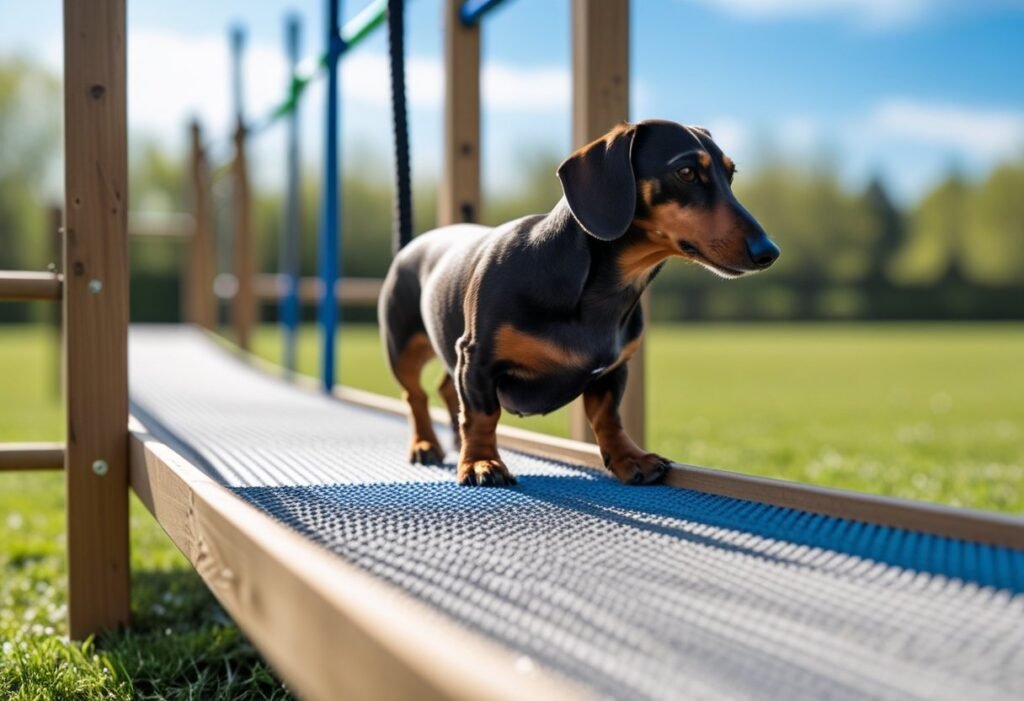
🎉 Grab your free Dachshund care checklist!
Don’t punish mistakes or hesitation 🚫. If your dog seems confused, back up and make things easier until they’re confident 🌟. Celebrate even small wins to keep them eager 🎯.
Use a marker word or a clicker to pinpoint good behavior 🔊. Say “yes” or click right when your dachshund does the right thing, then hand over the reward 🦴.
Building Confidence in New Environments 🌍
Bring in new equipment slowly in a spot your Dachshund already knows 🏡. Let your Doxie sniff and poke around at their own pace before you ask them to do anything specific 👃.
Start with low obstacles that won’t put pressure on your dog’s back 🦴. Tunnels and low jumps help them feel brave and keep their spine safe ✅.
As your dog gets better, you can make things a bit harder 📈. Just don’t rush it ⏳.
Try different training spots so your Dachshund gets used to new places 🏞️. Practice in your yard, parks, and even formal agility spaces to help them handle change 🔄.
Let your dog walk on grass, dirt, rubber, and carpet 🌱. That way, they won’t freeze up when they hit a new surface at an event 🏟️.
Set up “play dates” with calm, agility-loving dogs 🐕. Your Dachshund can pick up good habits just by watching and will feel less nervous with other animals around 🐾.
Mental Stimulation Through Agility Activities
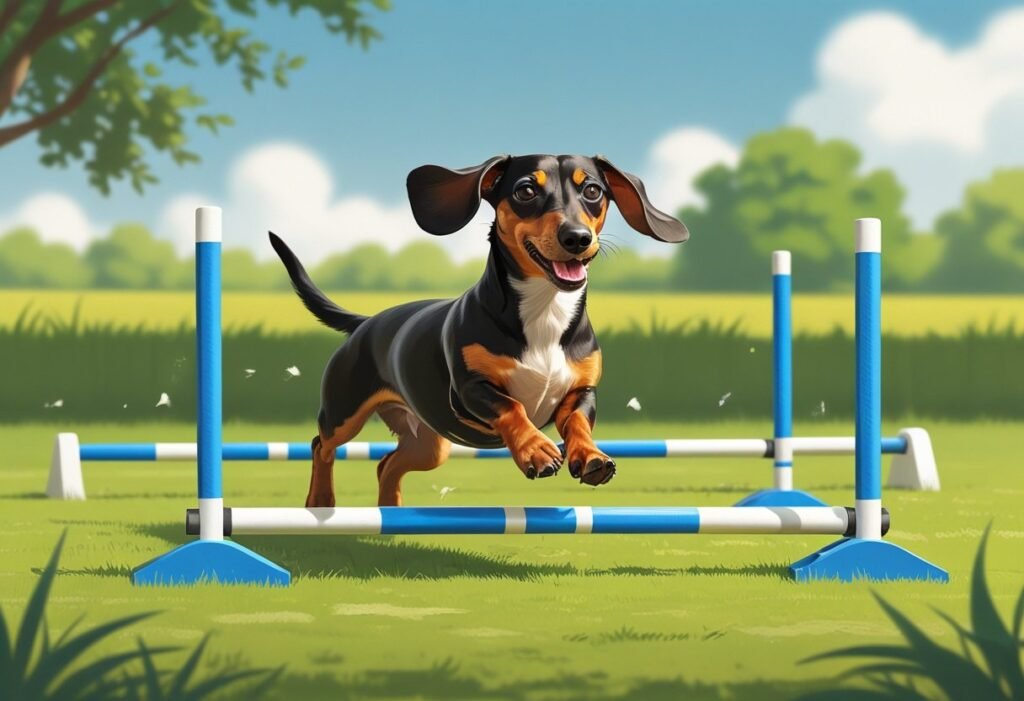
Agility isn’t just about exercise—it really works your Dachshund’s brain 🧠, too. These activities make them think fast ⚡, solve problems 🧩, and stay focused 🎯, which keeps boredom away 🚫.
Problem-Solving Obstacles 🛠️
Weave poles get your Dachshund thinking and moving carefully 🐾. Start with just a couple of poles spaced out, then make it trickier as they catch on 📈.
Tunnels are a trust exercise since your Doxie can’t see the end 🎪. Begin with short, straight tunnels and only add curves once they’re comfortable ✅.
Pause tables teach impulse control ⏸️. Your dog hops up, waits a few seconds, then continues—great for building focus 👀.
Tip: Always reward them right after they finish an obstacle 🎉. That way, they connect the challenge with something positive ❤️.
A-frames and seesaws make your Dachshund think about angles and surfaces ⚖️. These obstacles improve their awareness and decision-making skills 🧠.

🍲 ChefPaw Food Maker
- Fresh, clean ingredients you control
- Easy batch prep for training weeks
- Portion precision to protect backs and weight

⏱️ Petlibro Auto Feeder
- Scheduled meals for steady energy
- Precise portions to prevent overfeeding
- Keeps routines consistent around training
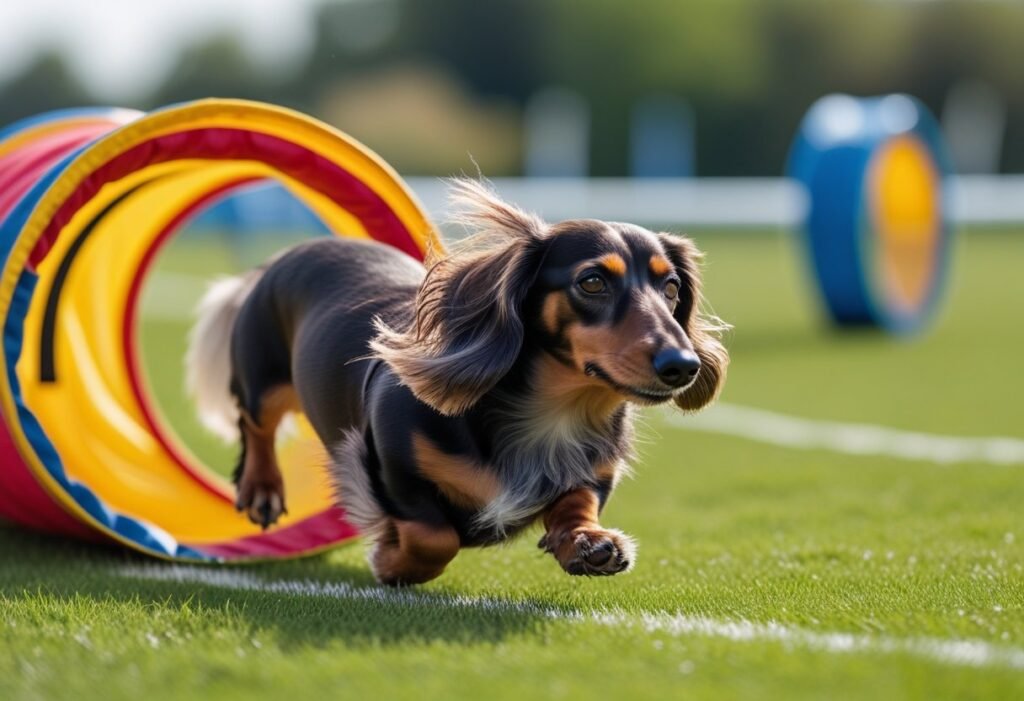
Agility Games to Challenge Your Dachshund 🎮
Hide and Seek Agility mixes searching with obstacles 🕵️♂️. Hide treats around the course so your Doxie has to work through everything to find them 🦴.
Follow My Lead builds communication 🤝. Walk beside your dog, using hand signals to guide them through a simple course, and watch their attention sharpen 👀.
Try Musical Obstacles 🎵. When the music stops, your Dachshund has to do something specific like “sit on the pause table” or “run through the tunnel” 🐕.
Memory Courses are fun for advanced dogs 🏆. Show them a short sequence, then see if they can remember it 📋. Start simple and add more as they improve 📈.
Timed Challenges bring a little excitement ⏱️. Use a stopwatch to track how they do, but don’t worry about speed until they’re accurate ✅.
Safe Doxie Sports Alternatives to Traditional Agility
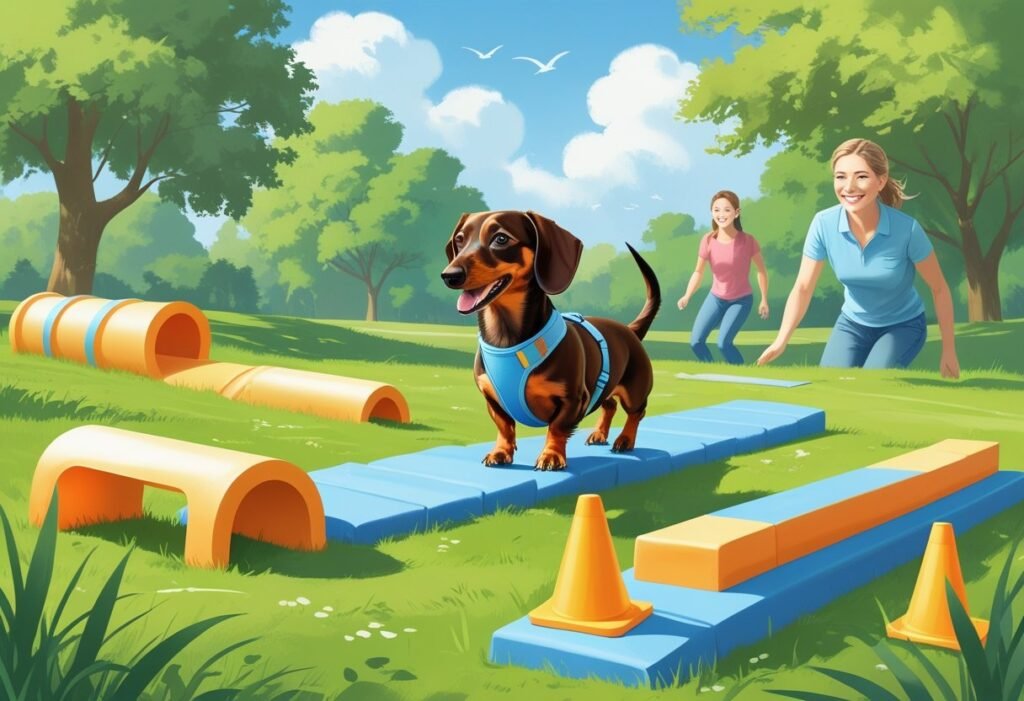
Traditional agility can be tough on a Dachshund’s back 🦴. Luckily, there are plenty of safer activities that still give your Doxie exercise 💪 and mental stimulation 🧠.
Low-Impact Sports for Dachshunds 🐾
Rally Obedience is a gentler alternative ✅. Your Dachshund follows you through a course of signs with easy commands like “sit” or “stay.” It’s slower, with less jumping and fewer sharp turns 🔄.
Barn Hunt taps into your Doxie’s natural hunting instincts 🕵️♂️. Dogs search for safely contained rats hidden in straw bales. There’s barely any jumping, but plenty of mental work 🧩.
Trick training builds coordination safely 🎯. Teach your Dachshund to weave between your legs, spin, or high-five—it’s fun and easy on their body 🐕.
Canine Freestyle (dog dancing) lets you make up routines to music 🎵. Pick moves that don’t stress your dog’s back but still keep them engaged ❤️.

🛏️ Majestic Pet Orthopedic Bed
- Supportive foam for spine and joints
- Bolstered sides for cozy recovery
- Durable cover for daily training life

📊 The Swiftest: Insurance Comparison Tool
- Quickly compare IVDD coverage options
- Find plans that fit active Dachshunds
- Save time and choose with confidence
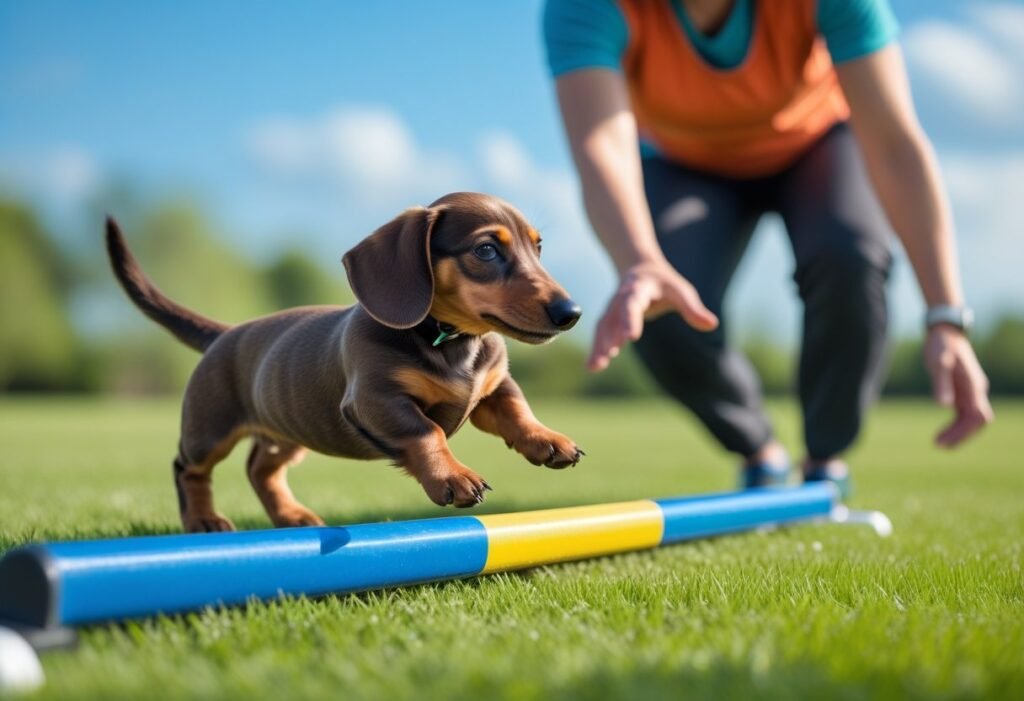
Canine Nose Work and Tracking 👃
Nose Work uses your Dachshund’s amazing sense of smell 🐽. Hide treats or scented objects around the house or yard and let your dog hunt them down. It’s great mental exercise and super low-impact 🌿.
Start with easy finds, then make them trickier as your dog gets better 📈. You can even join competitions 🏆, but home games work just fine 🏡.
Tracking lets your Dachshund follow scent trails outdoors 🌳. Use treats to make short, simple tracks. The slow pace keeps their back safe and satisfies their hunting urge 🐾.
Both activities help shy dogs feel braver 🌟 and give energetic Doxies a great mental workout 🧠. After these brain-intensive workouts, your dog will come home tired and happy 😌.
Common Challenges and How to Overcome Them
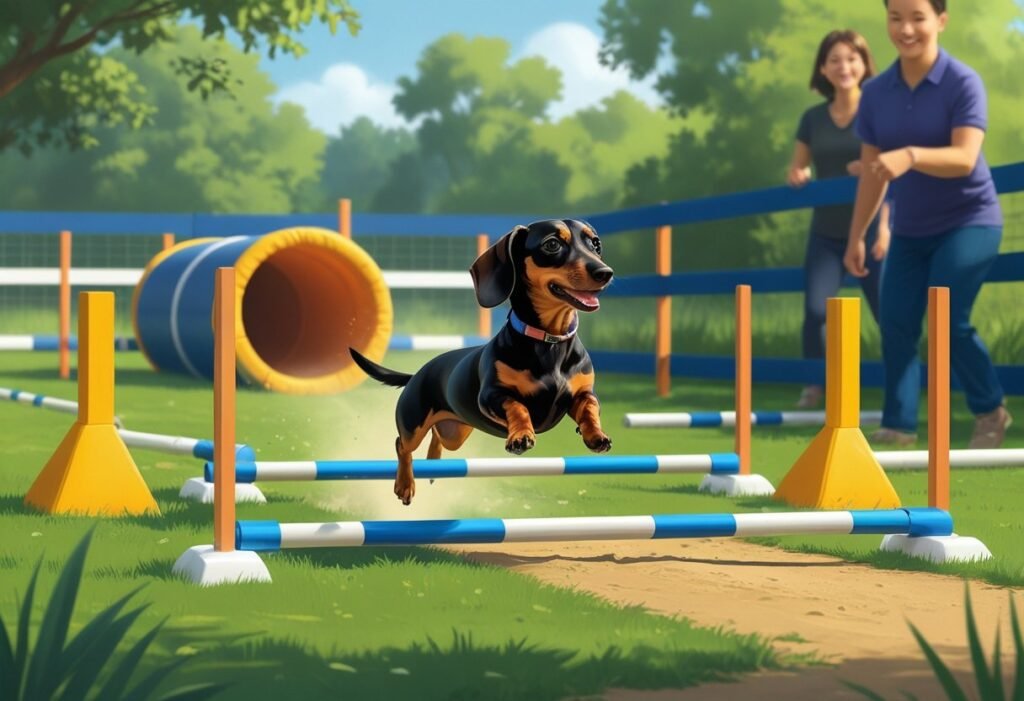
Dachshund owners run into some unique challenges with agility 🐾. Most of the time, it’s about their body shape or a sensitive personality, but you can work through these with the right approach ✅.
Managing Back and Joint Health 🦴
Dachshunds often deal with back problems because of their long spines ⚠️. Always warm up with a short walk 🚶♂️ or gentle play before any agility session 🎾.
Use low jumps—no higher than their elbows—to keep their spine safe 📏. Adjustable equipment is a lifesaver here 🛠️.
Keep your Dachshund at a healthy weight ⚖️. Extra pounds put more stress on their back and joints, so talk to your vet about diet if you’re not sure 🥗.
Add in core-strengthening exercises 💪. Try balance games on cushions or stability discs a couple times a week 🛋️.
If your dog seems reluctant to jump or climb 🚫, stop right away and check with your vet 🩺. Don’t take risks with their back ❤️.
🌟 Agility Support & Recovery Essentials for Your Doxie Athlete
- 💧 Petlibro Water Fountain — Hydration is key for active Dachshunds! Encourage steady drinking to keep joints lubricated and energy levels up during agility training.
- 📹 Petcube Bites 2 — Reward good performance instantly, even from afar! Toss treats, praise effort, and maintain motivation through consistent positive reinforcement.
- 🪜 Majestic Pet Stairs — Support your Doxie’s spine and joints between agility sessions. These stairs prevent strain from jumping onto beds or couches after exercise.
- 🧪 AnimalBiome Gut Health Test Kit — A healthy gut supports stamina and recovery. Identify imbalances that could affect energy, focus, or post-training digestion.
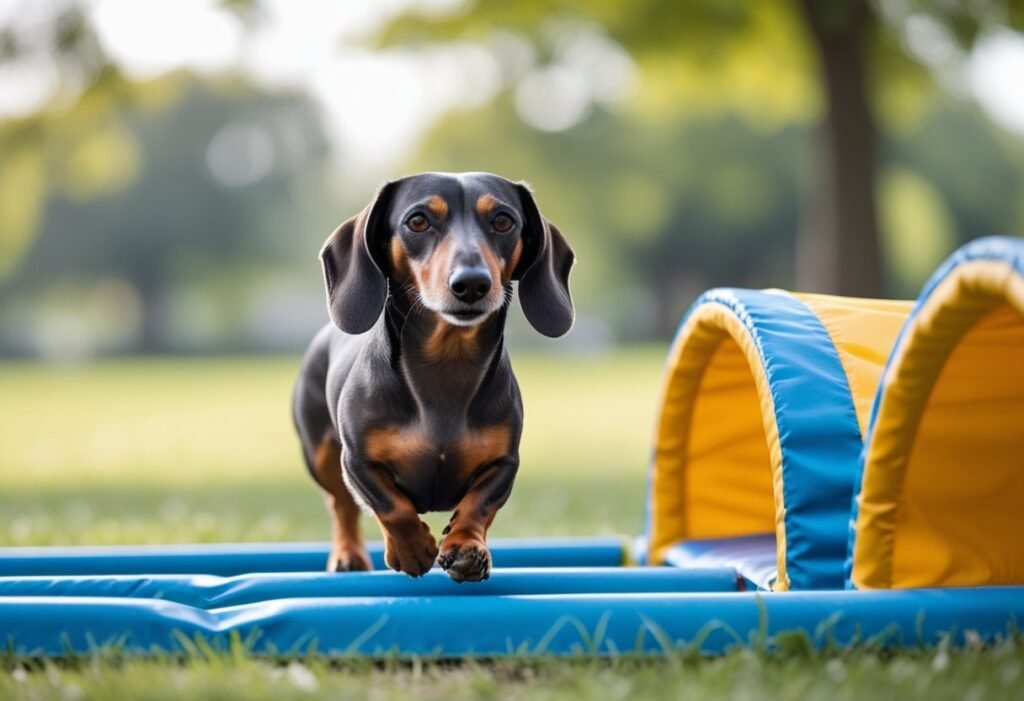
Training a Shy or Nervous Dachshund 🌱
Some Dachshunds get nervous about new equipment or busy places 😬. Use treats and praise to make new things feel safe and fun 🎉.
Try rewarding them with favorite toys 🧸 when they approach or interact with something new. Play makes everything easier 🐕.
Stick to quiet, familiar spots for early training 🏡. Your backyard is perfect before you try group classes or busy parks 🌳.
Keep sessions short—5 to 10 minutes tops ⏱️. Always end on a win, even if it’s something small 🌟.
Break tough obstacles into baby steps 🪜. If tunnels are scary, reward your dog just for looking at or sniffing the entrance at first 👃.
Creating a Long-Term Agility Routine for Your Dachshund
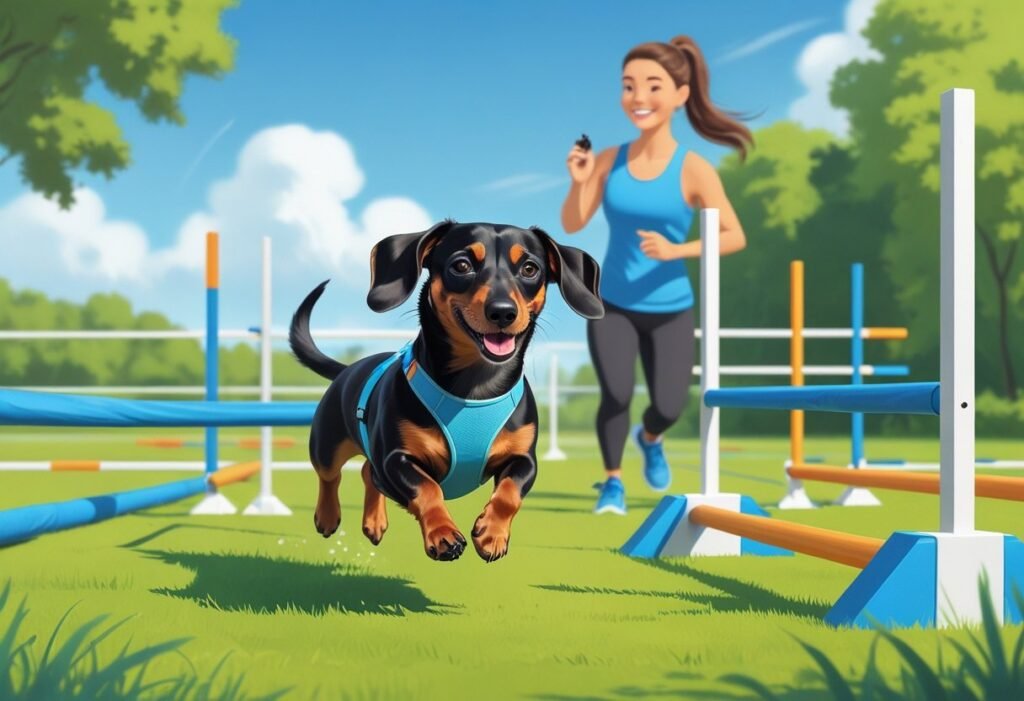
Building a solid agility routine for your Dachshund 🐾 takes patience and a bit of planning 📅. The right routine helps avoid injuries and sets up skills that’ll stick ✅.
Building Endurance Safely 💪
Start with short sessions—5 to 10 minutes, a couple times a week ⏱️. Your Dachshund’s back health really depends on slow progress, not big leaps ⚠️.
Watch your dog’s breathing and energy while you train 👀. If they start panting hard or seem tired, take a break 🛑.
Add just a minute each week to your sessions 📈. This slow build strengthens their heart ❤️ and muscles while keeping joints safe 🦴.
Rest days matter 💤. Muscles rebuild during downtime, and skipping rest can lead to overuse injuries 🚫.
Mix in low-impact stuff like swimming when it’s warm 🌊. Swimming gives great exercise without stressing their back 🌿.
🏅 Agility Training Essentials for a Confident, Fit, and Happy Doxie
- 🎽 Coastal Pet Harness (IVDD Version) – A secure, low-pull design that keeps your Dachshund comfortable and protected during agility exercises, reducing strain on their back and neck.
- 🌿 Innovet PurCBD Oil – Promotes calm focus and reduces post-exercise stiffness or anxiety. Perfect for helping your Doxie relax after agility sessions.
- 🧴 King Klean Dog Shampoo – Refresh your little athlete after every outdoor session. This gentle, natural shampoo keeps the coat soft, clean, and itch-free.
- 🎨 Purr & Mutt Personalized Dachshund Art – Capture your Doxie’s proud, post-training stance in a custom piece of art — a sweet reward for their hard work and progress.
- 👕 Dog is Good Apparel & Gifts – Celebrate your Dachshund’s journey with apparel and gifts that reflect your shared joy, patience, and teamwork through training.
🐕 Build strength, focus, and confidence — these essentials make agility training fun, safe, and rewarding for both you and your determined little athlete.
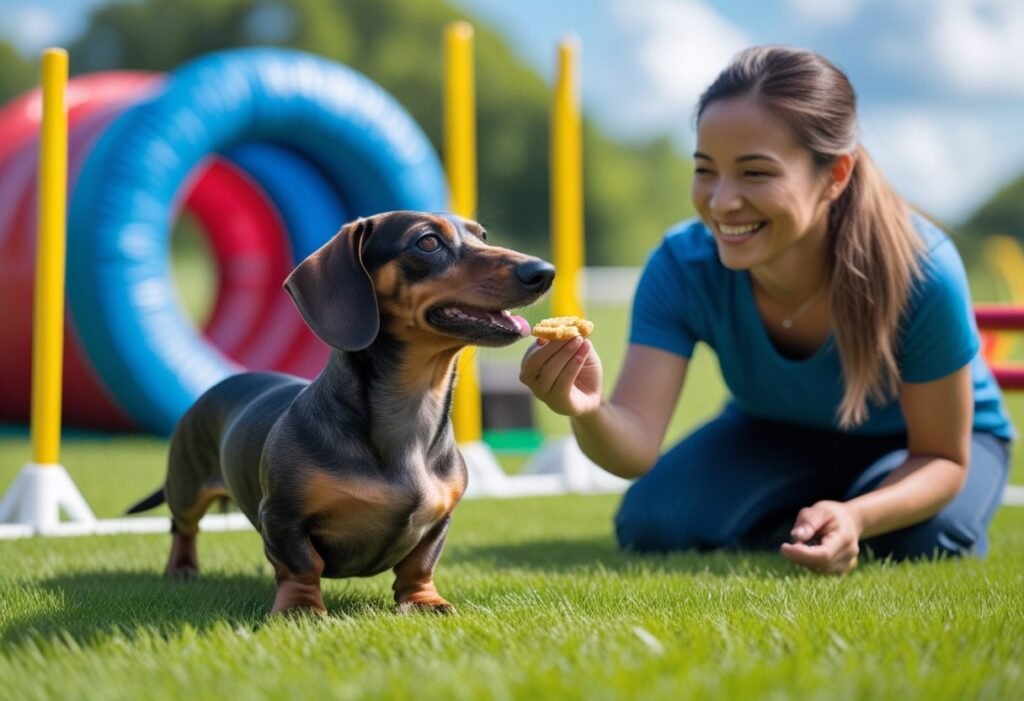
Setting Realistic Agility Goals 🎯
Focus on showing up regularly, not on fancy tricks at first 🐕. Repeating basic moves builds confidence and good habits 🌟.
Keep a simple notebook or app to track what your Dachshund enjoys or struggles with 📓. It’s surprisingly helpful ✅.
Set tiny goals like “run through tunnel with no hesitation” 🎪. Little wins add up fast 💡.
Adjust your goals for your dog’s age and health 🩺. Older Dachshunds need easier equipment and softer challenges 🌱.
Play to your dog’s strengths 💖. If they love tunnels, do more of those—just keep jumps low 📏.
Honestly, as long as your Dachshund is having fun 🎉, you’re doing it right. Competition is optional; enjoyment is not ❤️.
🐾 Don’t Miss Out!
Download our free Dachshund care guide to keep your furry friend happy and healthy.
Get Your Free Guide 🐶Frequently Asked Questions
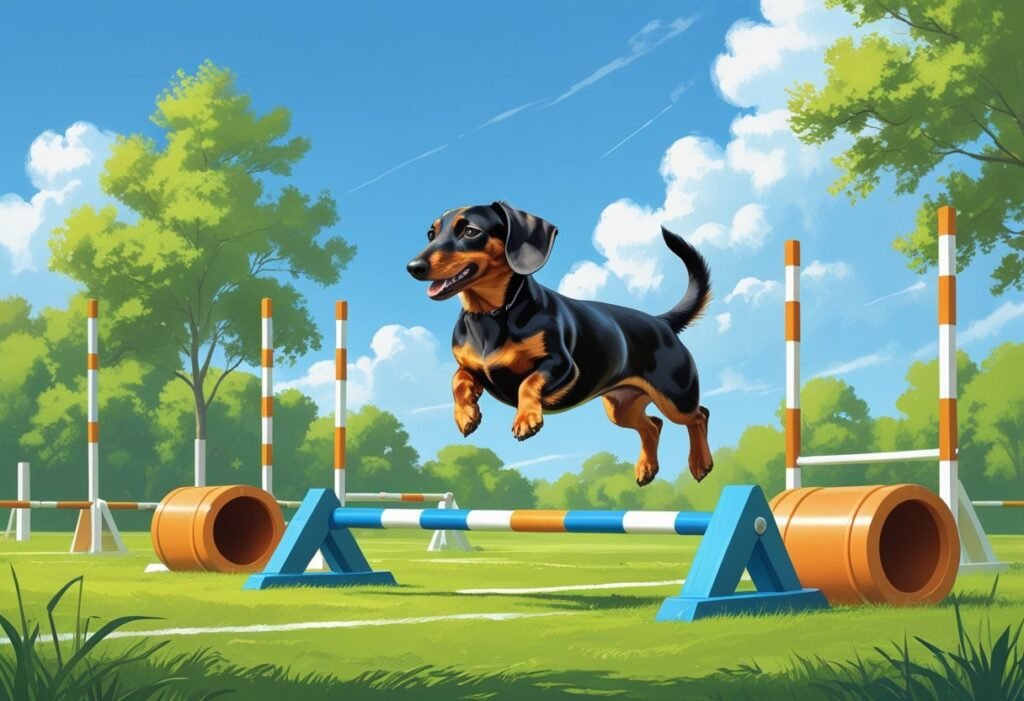
Dachshund owners usually have a lot of questions about getting started with agility 🐾. Here are some quick answers about exercises, safety, timing, and what to expect ✅.
What are the best agility exercises for dachshunds? 🏆
Low jumps are a great place to start 📏, keeping them at or below elbow height to protect their backs. Tunnel runs are fun and safe 🎪—it’s best to begin with short, straight tunnels before adding curves.
Weave poles are excellent for improving coordination 🔄, starting with the poles spaced far apart and gradually moving them closer as your dog becomes more skilled. A-frames and dog walks can work well too, provided you lower the height and use gentle inclines 🦴, always putting spine safety first.
How can you prevent injury during agility training for dachshunds? 🛡️
Always begin with a short warm-up walk 🚶♂️ to get your dog’s body ready for action. Use equipment designed for small dogs 🛠️ and avoid makeshift obstacles that could collapse or have sharp edges.
Keep your Dachshund at a healthy weight ⚖️ to minimize strain on their back, and make sure they train on non-slip surfaces 🐾 to prevent slipping. Taking regular breaks ⏳, even if your dog seems eager, helps prevent fatigue-related mistakes.
What age should a dachshund start agility training? 📅
Basic obedience can start as early as 8 to 12 weeks 🐕, creating a strong foundation for agility later on. Gentle agility activities such as tunnels and targeting 🎯 can be introduced between 6 and 12 months, focusing on confidence rather than speed.
Full agility training should wait until 12 to 18 months 💪, when their bodies are ready for higher-impact exercises. Senior Dachshunds can still enjoy agility 🌿 but should use easier equipment, take more breaks, and avoid high-impact movements.
How often should dachshunds participate in agility training? ⏱️
Beginners often do best with 10-15 minute sessions 🐾 two to three times a week, keeping things short and positive to prevent burnout. Once they are more experienced, sessions can be extended to 20-30 minutes 🔍, but you should always watch for signs of fatigue.
Allow at least one rest day 💤 between training sessions to give muscles time to recover, and vary the exercises ⚖️ to work different muscle groups and promote balanced strength.
What are signs of overexertion in dachshunds during agility workouts? ⚠️
Heavy panting 😮💨 or excessive drooling can be an early sign they need a break. Slowing down, skipping obstacles, or showing reluctance to continue may indicate tiredness.
Limping or favoring a leg 🚫 is a sign to stop immediately and seek veterinary advice. If your dog becomes cranky or avoids participating 🐕, it’s best to let them rest and reassess before continuing.
Can agility training have behavioral benefits for dachshunds? 🐶
Agility provides a fantastic mental workout 🧠 that channels a Dachshund’s energy into something positive, reducing destructive habits like digging or chewing. Consistent training strengthens your bond ❤️, building trust and teamwork.
Many Dachshunds gain confidence 🌟 and become more comfortable in new environments after agility practice. For dogs with anxiety, the structure and encouragement agility offers can help them feel safe and more at ease.

